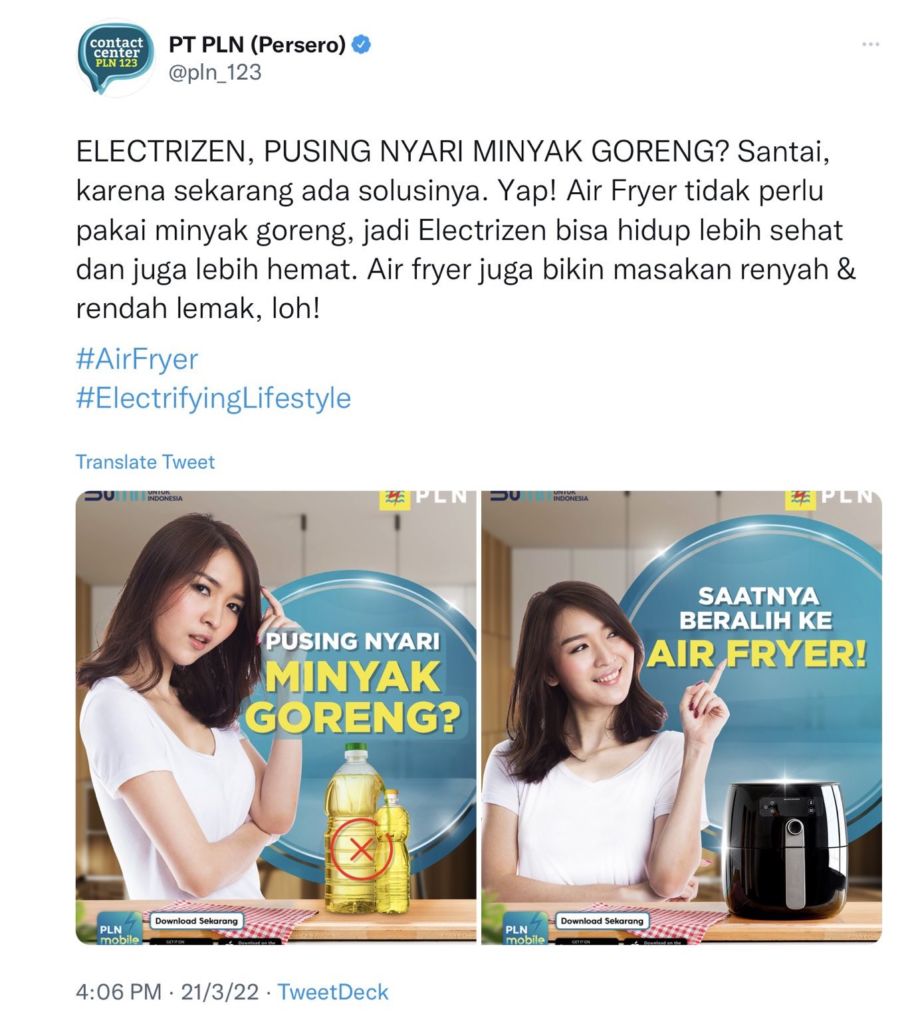Indonesia’s state-owned electricity company PLN has attracted a great deal of negative buzz over its failure to read the room amid a cooking oil shortage in the country.
On Monday, PLN posted a tweet calling on its customers to move on from cooking oil and implied that we should all be capable of going bougie and buying an air fryer.
“ELECTRIZENS, IS LOOKING FOR COOKING OIL GIVING YOU A HEADACHE? Relax, because now there’s a solution. Yep! An air fryer does not require cooking oil, so Electrizens can live healthy and save money as well. Air fryers can also cook crunchy and low-fat food, too!” the tweet reads, addressing readers using a god awful portmanteau of the words electricity and netizen.

The tweet attracted quite the public outrage, with “electrizens” accusing PLN of being tone deaf, especially as air fryers are simply out of reach for low-income Indonesians. Some also pointed out that those most affected by the cooking oil shortage likely live in houses that are unable to provide power to the energy-hungry appliance.
PLN has deleted the tweet. As of this article’s publication, the firm has not issued a public statement addressing the controversy.
PLN isn’t the only one who has been accused of being tone deaf amid the cooking oil crisis.
Last week, PDI-P chairwoman and former president Megawati Soekarnoputri went full Marie Antoinette and said, “The problem is not about cooking oil being expensive. I’ve stopped to think, do ladies just fry their food everyday? To the point that they’re fighting [over cooking oil]?” She then added, “Is there no way to boil or steam or make rujak (sweet/spicy fruit salad)? Those are Indonesian dishes. Why are people complicating this?”
Megawati has been widely panned over her statement, which many say are both sexist and tone deaf. She has not issued a public apology, and her PDI-P party has defended her and suggested that it is the public that has to think the way she does and unlearn habits formed over generations.
Indonesia, the world’s largest producer of palm oil, is ironically in the midst of a cooking oil shortage. Despite a government-imposed price cap, retail prices for the product have nearly doubled in recent weeks. It has come to a point where Indonesians are reportedly rushing to get their hands on government-subsidized cooking oil as they disappear from traditional markets and supermarkets.
Rising domestic consumption and skyrocketing palm oil prices are likely the main causes of the crisis, but Indonesian police are also cracking down on alleged hoarders of cooking oil who aim to manipulate the market and sell the product later at a higher cost.




